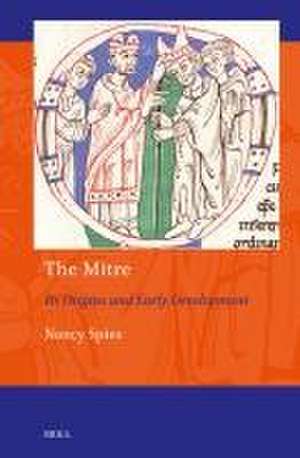The Mitre: Its Origins and Early Development: Art and Material Culture in Medieval and Renaissance Europe, cartea 21
Autor Nancy Spiesen Limba Engleză Hardback – 20 iun 2024
Din seria Art and Material Culture in Medieval and Renaissance Europe
- 18%
 Preț: 1022.23 lei
Preț: 1022.23 lei - 18%
 Preț: 755.93 lei
Preț: 755.93 lei - 18%
 Preț: 707.86 lei
Preț: 707.86 lei - 18%
 Preț: 903.85 lei
Preț: 903.85 lei - 18%
 Preț: 684.81 lei
Preț: 684.81 lei - 18%
 Preț: 766.36 lei
Preț: 766.36 lei - 18%
 Preț: 953.66 lei
Preț: 953.66 lei - 18%
 Preț: 945.19 lei
Preț: 945.19 lei - 18%
 Preț: 882.28 lei
Preț: 882.28 lei - 18%
 Preț: 702.37 lei
Preț: 702.37 lei - 18%
 Preț: 671.14 lei
Preț: 671.14 lei - 18%
 Preț: 731.48 lei
Preț: 731.48 lei - 18%
 Preț: 778.50 lei
Preț: 778.50 lei - 18%
 Preț: 808.16 lei
Preț: 808.16 lei - 18%
 Preț: 635.76 lei
Preț: 635.76 lei - 18%
 Preț: 1084.43 lei
Preț: 1084.43 lei - 18%
 Preț: 951.89 lei
Preț: 951.89 lei - 18%
 Preț: 769.14 lei
Preț: 769.14 lei - 18%
 Preț: 986.96 lei
Preț: 986.96 lei - 18%
 Preț: 615.60 lei
Preț: 615.60 lei
Preț: 760.64 lei
Preț vechi: 927.61 lei
-18% Nou
Puncte Express: 1141
Preț estimativ în valută:
145.55€ • 152.35$ • 121.14£
145.55€ • 152.35$ • 121.14£
Carte disponibilă
Livrare economică 13-18 martie
Preluare comenzi: 021 569.72.76
Specificații
ISBN-13: 9789004691049
ISBN-10: 9004691049
Pagini: 400
Dimensiuni: 155 x 235 mm
Greutate: 0.86 kg
Editura: Brill
Colecția Brill
Seria Art and Material Culture in Medieval and Renaissance Europe
ISBN-10: 9004691049
Pagini: 400
Dimensiuni: 155 x 235 mm
Greutate: 0.86 kg
Editura: Brill
Colecția Brill
Seria Art and Material Culture in Medieval and Renaissance Europe
Notă biografică
Nancy Spies is an independent scholar researching medieval textiles, particularly ecclesiastical garments. Among her published articles and books is the groundbreaking Ecclesiastical Pomp and Aristocratic Circumstances: A Thousand Years of Brocaded Tabletwoven Bands, (2000).
Cuprins
Preface
Acknowledgements
List of Figures and Tables
Introduction
1 What Is a Mitre? A New Definition
2 Terminology
3 Terms Specific to the Mitre
4 Bands, Ornamental
1 Finding and Examining the Evidence
1 Sample Collecting: Methodology
2 Examination of the Visual Evidence
3 General Statistics
4 The First Mitre Images – Styles and Orientation – from the End of the Eleventh Century to 1115
5 Mitres from 1119 to the End of the Twelfth Century–Beginning of the Thirteenth Century
6 Lobed Mitres
7 Peaked Mitres
8 Details of the Mitres Themselves
9 Mitres at the End of the Twelfth Century–Beginning of the Thirteenth Century
10 The Choice of Images
11 Issues for Consideration
12 Extant Mitres
13 Who Wore the Mitre?
2 Testing the Development
1 Braun’s Version of the Early Evolution of the Mitre
2 The Conical Hat on Ecclesiastical Heads
3 The Round Hat on Ecclesiastical Heads
4 Experimental Archaeology
5 The Conical Hat and the Round Hat
6 The Lobed Mitre
7 The Peaked Mitre
3 Understanding the Institutional Context
1 Vestments
2 Church Rituals
4 Reading the Documents
1 Eleventh-Century Written Evidence
2 Twelfth-Century Written Evidence
3 Gifting, the Miraculous, the Purely Political
5 Searching for Origins
1 Religious and Political Factors
2 Origins of the Peaks and the Lobes
3 Geographical Origins
4 A Special Situation: Bohemia (Poland and the Czech Republic)
6 Declaring the Winner
Conclusions
Appendices A–G
Appendix A: Examples of the Conical Hat on Ecclesiastical Heads
Appendix B: Examples of the Round Hat on Ecclesiastical Heads
Appendix C: Examples of Mitra Interpretations from Old Testament and Ancient Greek Sources
Appendix D: Outlier Hats on Ecclesiastical Heads
Appendix E: Mitres on Ecclesiastical Heads from the Late 11th Century to the Beginning of the 13th Century
Appendix F: 13th Century (to 1250) Mitres on Ecclesiastical Heads (Exceptions Only)
Appendix G: Secular Lobed Hats and Pouches (Bags)
Glossary
Bibliography
Index
Acknowledgements
List of Figures and Tables
Introduction
1 What Is a Mitre? A New Definition
2 Terminology
3 Terms Specific to the Mitre
4 Bands, Ornamental
1 Finding and Examining the Evidence
1 Sample Collecting: Methodology
2 Examination of the Visual Evidence
3 General Statistics
4 The First Mitre Images – Styles and Orientation – from the End of the Eleventh Century to 1115
5 Mitres from 1119 to the End of the Twelfth Century–Beginning of the Thirteenth Century
6 Lobed Mitres
7 Peaked Mitres
8 Details of the Mitres Themselves
9 Mitres at the End of the Twelfth Century–Beginning of the Thirteenth Century
10 The Choice of Images
11 Issues for Consideration
12 Extant Mitres
13 Who Wore the Mitre?
2 Testing the Development
1 Braun’s Version of the Early Evolution of the Mitre
2 The Conical Hat on Ecclesiastical Heads
3 The Round Hat on Ecclesiastical Heads
4 Experimental Archaeology
5 The Conical Hat and the Round Hat
6 The Lobed Mitre
7 The Peaked Mitre
3 Understanding the Institutional Context
1 Vestments
2 Church Rituals
4 Reading the Documents
1 Eleventh-Century Written Evidence
2 Twelfth-Century Written Evidence
3 Gifting, the Miraculous, the Purely Political
5 Searching for Origins
1 Religious and Political Factors
2 Origins of the Peaks and the Lobes
3 Geographical Origins
4 A Special Situation: Bohemia (Poland and the Czech Republic)
6 Declaring the Winner
Conclusions
Appendices A–G
Appendix A: Examples of the Conical Hat on Ecclesiastical Heads
Appendix B: Examples of the Round Hat on Ecclesiastical Heads
Appendix C: Examples of Mitra Interpretations from Old Testament and Ancient Greek Sources
Appendix D: Outlier Hats on Ecclesiastical Heads
Appendix E: Mitres on Ecclesiastical Heads from the Late 11th Century to the Beginning of the 13th Century
Appendix F: 13th Century (to 1250) Mitres on Ecclesiastical Heads (Exceptions Only)
Appendix G: Secular Lobed Hats and Pouches (Bags)
Glossary
Bibliography
Index
